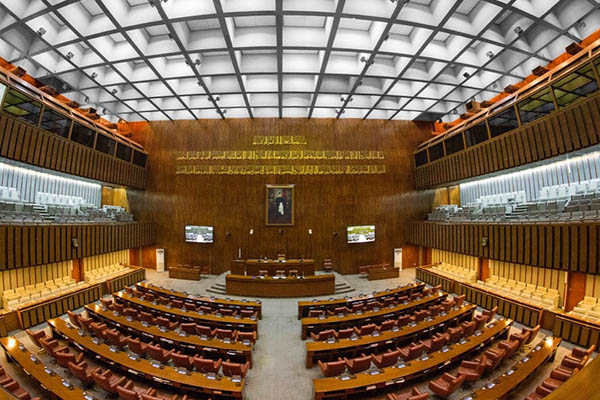
File photo of Pakistan Senate
Pakistan Peoples Party (PPP) Senator Farooq H. Naek on Monday sought to curb the powers of the Judicial Commission of Pakistan (JCP) to unilaterally appoint judges to the superior courts, moving a moved a constitutional amendment bill in the Senate that will grant the parliamentary committee a say in the process.
The private member bill was referred to the Standing Committee on Law and Justice by Senate Chairman Muhammad Sadiq Sanjrani, who directed it to submit a report to the House within 15 days.
Explaining the salient features of the proposed bill in the House, Naek said the JCP, which appoints judges to the Supreme Court, currently comprises the chief justice of Pakistan, four judges of the Supreme Court, a retired judge of the Supreme Court, the federal law minister, attorney general for Pakistan, and a senior advocate. Noting this was heavily tilted in the judges’ favor, he said the proposed law sought to exclude one of the four sitting judges and the retired judge to make it a seven-member panel.
Similarly, he said, the law sought to change the composition of the commission for appointment of high court judges by reducing its strength from 13 to 11. Detailing his intent behind the draft law, the senator said he did not wish to speak about the allegations of favoritism in the appointment of judges. However, he noted, the Constitution did not outline any criteria for advocates to be named for judicial appointments. The bill, he said, proposes an initiation committee to propose names within 60 days after a vacancy occurs, adding this should be headed by the respective judge of the high court and comprise the next two senior-most judges, an advocate-general and a bar council member.
The bill also seeks to streamline the process of appointment of high court chief justices, saying it should on the same pattern as that of the Supreme Court.
The draft law, Naek stressed, would enable the parliamentary committee to examine credentials, capability, moral, and financial integrity of all judicial nominees, adding that the committee would be required to confirm any nominee with a majority within 30 working days and if it failed to do so, the nomination would be considered to have been confirmed. He said a nominee could only be rejected if three-fourths of the 8-member committee voted against.
Under the proposed law, any decision of the parliamentary committee would not be called in question in any court on any ground whatsoever. “We want independent as well as efficient judges,” he added.
